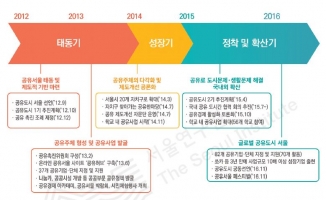제목배경이미지:  [Crecimiento Inclusivo] Compartiendo el Proyecto Ciudad de Seúl
[Crecimiento Inclusivo] Compartiendo el Proyecto Ciudad de Seúl
Background: Challenges & Objectives
Background
Under these circumstances, there is a dire need to come up with solutions that are entirely new and different from those of the past. While the city has focused heavily on economic growth and hardware development, it is now time to turn its sights toward investing in the development of software that will enrich the lives of its citizens. In addition, greater citizen engagement and cooperation between the public and private sectors is required to solve these social problems, or achieve social reform, rather than continuing to rely entirely on the government.
Objectives
.JPG)
Actions& Implementation
Nanum Car and shared parking
Seoul City’s Nanum Car (car sharing) and shared parking projects are improving urban transport in the city. The most successful model of the sharing economy in Seoul is the car sharing company SOCAR. As one shared car can replace 16.8 owned cars, car sharing has the potential to solve numerous parking and environment-related problems. Seoul City’s car sharing project stands to become a representative model of the sharing economy, as it achieves a perfect marriage of public and private resources. Also, it is thanks to the parking spaces secured by Seoul in public buildings and other areas throughout the city for the Nanum Car project that car sharing businesses such as SOCAR have been able to successfully operate their businesses.
Description: Seoul's Sharing Car called "Nanum Car"
Source: SMG
Intergenerational home sharing
“Sharing” is now a buzzword in the field of architecture, with home sharing having become a new, popular housing trend among young people. Seoul City created the intergenerational home sharing program to match senior citizens who own homes with unused rooms with college students in need of reasonably priced housing, thereby helping reduce elderly homeowners’ sense of isolation and providing them with regular income generated through renting out rooms while mitigating the shortage of student housing. At first, it was challenging to get eligible seniors to take a chance on trusting their potential housemates, but they finally opened their minds and agreed to participate in the program.
(Source: SMG)
Opening of public spaces
Seoul City has opened the basement of the Seoul City Hall building to the public. Called “Citizens Hall,” the basement serves as an excellent venue for citizens to meet other people, enjoy diverse cultural events, attend the Seoul Idea Expo, shop at Seoul Market, and hold wedding ceremonies. Seoul City is also expanding the shared public facilities program to include district offices, community centers, schools, and religious facilities.
Results & Evaluation
Statistics show that one out of every four Seoulites owns a car. However, 770,000 cars, or 35 percent of all cars owned by Seoul citizens, are driven less than 7,000 kilometers a year, and 330,000 cars, or 15 percent, are used only on weekends. With car sharing, however, citizens no longer have to own cars or spend large sums of money on maintenance. Moreover, by using a car sharing service, they can contribute to relieving traffic congestion and reducing air pollution. To achieve these aims, SOCAR started a car sharing service in partnership with Seoul City, and offers free or discounted services to low-income citizens or people with physical disabilities. Anyone, including young people who are struggling financially, can access cars at affordable prices whenever they need them.
According to a survey of 2,500 Seoulites conducted online in May 2016 regarding their awareness of Seoul City’s 16 Sharing City Seoul projects, including Nanum Car, nine out of 10 respondents said they were aware of at least one of the projects, and 82 percent of those who had used one of the services answered that they were satisfied with it.
Expectancy effects & Need for Improvement
1. Creation of Sharing City Seoul, preparation for establishment of institutional foundation, and discovery of sharing projects
2. Period of growth through diversification and public hearings for improvement
3. Period of Adjustment and Expansion
Department / Contact
- International Relations Division, Seoul Metropolitan Government / international@seoul.go.kr
.JPG)
.JPG)